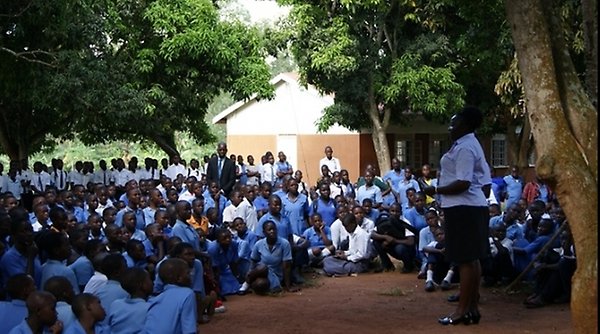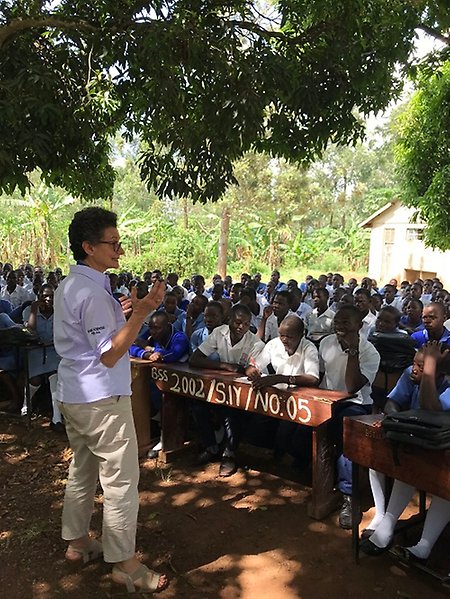"It’s about having role models”
What’s needed to give girls in East Africa the opportunity to study science at university level? Well, one way is to hold a summer school at Uppsala University. This resulted in networks that have contributed to a 90 percent increase in female students in mathematics and physics at Makerere University in Uganda.

The Eastern Africa Network for Women in the Basic Sciences (EANWoBAS) at Bunya High school in Uganda.
“When the girls meet us, they get a glimpse of what opportunities can open up for them after they have studied mathematics or physics,” says Carla Puglia, Programme Director in Physics within the International Science Programme (ISP).
It was in 2016 that the ISP hosted a summer school at Uppsala University in collaboration with the Department of Physics and Astronomy and Freie Universität Berlin. Over 10 days, 21 female students and researchers from Germany, Kenya, Sweden and Uganda gathered in Uppsala. The aim was to create global networks and mentoring relationships between students and researchers in physics and mathematics.
One of the participants at the summer school was Betty Nannyonga, researcher in mathematics at Makerere University in Uganda and a former doctoral student at Uppsala University who received funding from the ISP. For a long time, she has been active in getting more girls in Uganda interested in mathematics, and saw the summer school as a chance to share her experiences. In Uppsala, she met physicist Alix Dehayem from Kenya, who works in one of the supported ISP groups. Together, they decided to lay the foundations for a network to promote gender equality in the basic sciences in the region: the Eastern Africa Network for Women in the Basic Sciences, or EANWoBAS.
The network has since grown and today brings together students, researchers and lecturers in mathematics and physics from universities in Kenya, Rwanda, Tanzania, Uganda and Zambia. From 2019, the ISP is also contributing funding to the EANWoBAS.
- ISP selects groups and networks with a view to their potential to build research capacity, says Carla Puglia, who is also a senior lecturer at the Department of Physics and Astronomy.
- ISP doesn’t get involved with the focus of these projects. But we do mediate contacts with mentors and experts who students might conceivably need to expand their contact networks.
An important goal of the ISP is to increase the representation of women in the basic sciences physics, mathematics and chemistry. To do this, you need to work at all levels – from primary school all the way through to doctoral education, says Carla Puglia. Just getting more students at all into mathematics and physics at university level requires significant inputs during the early school years.
Many members of the EANWoBAS work with teacher education in mathematics and physics and they work hard, reaching out to schools and inspiring the students there.
Change on several levels

Carla Puglia at Bunya High school inMayuge district, Uganda.
At the end of March 2019, the network organised an inspirational tour of high schools in Uganda. Carla Puglia and Rebecca Andersson, project coordinator at ISP, also went on the tour. Their photos show big flocks of school students – so many that the meetings had to be held outdoors. However, not many of the young girls at these schools are expected to choose science after high school.
One reason for encouraging girls to choose to study physics and mathematics at university level is the current lack of female role models, explains Carla Puglia. Female teachers in these subjects are rare in primary and secondary schools. In addition, girls say that they are often ignored and don’t get answers to their questions in class.
- It was really good that we got the chance to chat to the girls in smaller groups, says Carla Puglia. The girls in the group I worked with were around 17-18 years old, and were going to choose mathematics and physics for their following senior high school years. We teachers, doctors and professors got the chance to tell them about our experiences, why we women had chosen to study these subjects and why physics and mathematics are important.
The students also filled out a survey form asking them to describe their biggest challenges in relation to school and studies. The report from this survey is still in the process of being compiled, but something Carla Puglia has heard in the past is that girls are expected to marry instead of continuing to study.
How can this be changed?
- One way is to support the EANWoBAS because it’s made up of women who have gone through and come up against these prejudices. We don’t have a ready-made solution – they will need to find their own way to achieving a gender balance. We hope that they will work out their own tools for breaking down the cultural barriers to girls continuing to study at university level, and we offer them support in this.
The network’s activities include workshops with parents and gatherings with teachers, researchers and school principals to raise awareness of the gender inequality in the sciences in schools and universities. A summer school in physics and mathematics for girls has also been held at the University of Dar es Salaam. But Carla Puglia would like to emphasise in particular the positive developments at Makerere University in Uganda.
- Previously, only between 4 and 6 female students chose physics or mathematics as her main subject. But after one and a half years of Betty Nannyonga’s activities, roughly 40 female students are now choosing to study mathematics and physics. That’s just wonderful!
But I have also said that ‘you need to be cautiously optimistic and monitor retention rates carefully’. Because if these female students encounter a lot of resistance and setbacks at university, then they will just disappear. So at the next meeting of the network, the older members of the network will undergo training to find how to retain these female students and identify the changes that need to be introduced. Efforts that make it easier for women to keep studying are important, says Carla Puglia.
Read more:
"More female researchers with Sida’s support" - Interwiew with Betty Nanyonga. Text in Swedish
